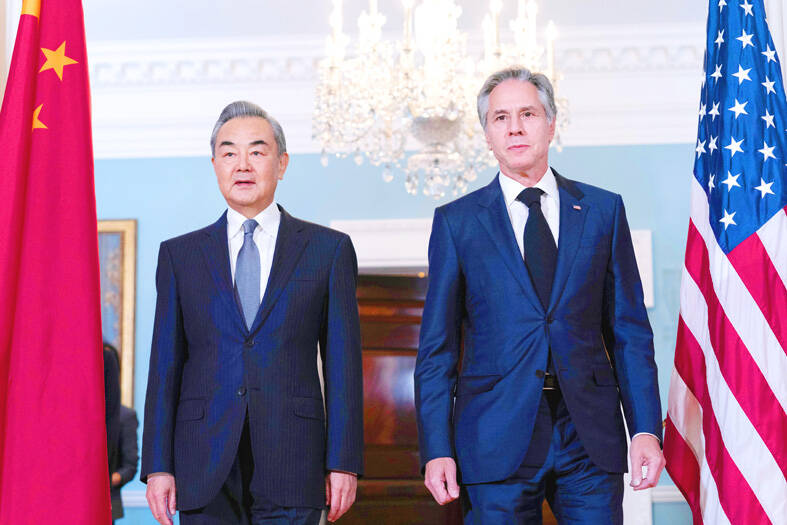US Secretary of State Antony Blinken this week is to pay his second visit in less than a year to China, where he is to ask Beijing to avoid “provocative” measures during next month’s inauguration of president-elect William Lai (賴清德).
Blinken’s trip from Wednesday through Friday marks a further lowering of US-China friction that soared under former US president Donald Trump.
However, US President Joe Biden, while seeking greater stability between the world’s two largest economies, has kept up the pressure.

Photo: AP
In the days ahead of Blinken’s trip, Biden met jointly with the leaders of US allies Japan and the Philippines, both wary of China, and moved to raise steel tariffs on a “cheating” China.
“We are in a different place than we were a year ago when the bilateral relationship was at an historic low point,” a senior US official told reporters ahead of the trip announcement.
“We’ve set out to stabilize the bilateral relationship without sacrificing our capacity to strengthen our alliances, compete vigorously and defend our interests,” he said on customary condition of anonymity.
Amid the issues expected to be discussed is Taiwan, particularly Lai’s inauguration.
“Our expectation will be, particularly during this important and sensitive time leading up to the May 20 inauguration, that all countries will contribute to peace and stability, avoid taking provocative actions that may raise tensions, and demonstrate restraint,” the official said.
US officials quietly believe that improved US-China relations helped avoid worse-case scenarios of Chinese pressure during the elections in January.
Also high on Blinken’s agenda would be what US officials say is a major push by China that has helped Russia, in the throes of the Ukraine invasion, carry out its biggest militarization since Soviet times.
Blinken is to take the message directly to Beijing after encouraging European allies to make their concerns known with China, which is seen as eager for smooth relations with the West as it faces economic headwinds.

CRITICAL MOVE: TSMC’s plan to invest another US$100 billion in US chipmaking would boost Taiwan’s competitive edge in the global market, the premier said The government would ensure that the most advanced chipmaking technology stays in Taiwan while assisting Taiwan Semiconductor Manufacturing Co (TSMC, 台積電) in investing overseas, the Presidential Office said yesterday. The statement follows a joint announcement by the world’s largest contract chipmaker and US President Donald Trump on Monday that TSMC would invest an additional US$100 billion over the next four years to expand its semiconductor manufacturing operations in the US, which would include construction of three new chip fabrication plants, two advanced packaging facilities, and a research and development center. The government knew about the deal in advance and would assist, Presidential

‘DANGEROUS GAME’: Legislative Yuan budget cuts have already become a point of discussion for Democrats and Republicans in Washington, Elbridge Colby said Taiwan’s fall to China “would be a disaster for American interests” and Taipei must raise defense spending to deter Beijing, US President Donald Trump’s pick to lead Pentagon policy, Elbridge Colby, said on Tuesday during his US Senate confirmation hearing. The nominee for US undersecretary of defense for policy told the Armed Services Committee that Washington needs to motivate Taiwan to avoid a conflict with China and that he is “profoundly disturbed” about its perceived reluctance to raise defense spending closer to 10 percent of GDP. Colby, a China hawk who also served in the Pentagon in Trump’s first team,

SEPARATE: The MAC rebutted Beijing’s claim that Taiwan is China’s province, asserting that UN Resolution 2758 neither mentions Taiwan nor grants the PRC authority over it The “status quo” of democratic Taiwan and autocratic China not belonging to each other has long been recognized by the international community, the Mainland Affairs Council (MAC) said yesterday in its rebuttal of Beijing’s claim that Taiwan can only be represented in the UN as “Taiwan, Province of China.” Chinese Minister of Foreign Affairs Wang Yi (王毅) yesterday at a news conference of the third session at the 14th National People’s Congress said that Taiwan can only be referred to as “Taiwan, Province of China” at the UN. Taiwan is an inseparable part of Chinese territory, which is not only history but

INVESTMENT WATCH: The US activity would not affect the firm’s investment in Taiwan, where 11 production lines would likely be completed this year, C.C. Wei said Investments by Taiwan Semiconductor Manufacturing Co (TSMC, 台積電) in the US should not be a cause for concern, but rather seen as the moment that the company and Taiwan stepped into the global spotlight, President William Lai (賴清德) told a news conference at the Presidential Office in Taipei yesterday alongside TSMC chairman and chief executive officer C.C. Wei (魏哲家). Wei and US President Donald Trump in Washington on Monday announced plans to invest US$100 billion in the US to build three advanced foundries, two packaging plants, and a research and development center, after Trump threatened to slap tariffs on chips made